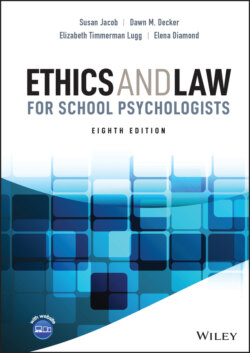Читать книгу Ethics and Law for School Psychologists - Susan Jacob - Страница 31
Self-Determination and Autonomy
ОглавлениеSchool psychologists “respect the right of persons to participate in decisions affecting their own welfare” (NASP Guiding Principle I.1). They apply the ethical principle of respect for self-determination and autonomy to their professional practices by seeking informed consent to establish a school psychologist–client relationship and by ensuring that the individuals with whom they work have “a voice and a choice” in decisions that affect them.
School psychologists sometimes ask the question, “Who is the client?” In the school setting, multiple different parties may be recipients of school psychological services or affected indirectly by their decisions. NASP’s code of ethics identifies the client or clients as the individuals who have entered into a school psychologist–client relationship for the purpose of receiving services. A school psychologist–client relationship is established by an informed agreement with a client about the school psychologist’s duties to each party in the professional relationship (NASP, 2020, p. 41). Often more than one individual is a primary client, such as when the school psychologist-client professional services relationship involves parents and their child (also CPA, 2017).
Except for urgent situations, school psychologists generally seek the informed consent of an adult (the parent or guardian of a child) to establish a school psychologist–client relationship (NASP Standard I.1.2). They respect the right of the individual providing consent to choose or decline the services offered (NASP Standard I.1.5), and they “reopen discussion of consent when appropriate, such as when there is a significant change in previously agreed on goals and services, or when decisions must be made regarding the sharing of sensitive information with others” (NASP Guiding Principle I.1). School psychologists also honor, to the maximum extent appropriate, the right of children to assent to or decline school psychological services (see Chapters 3 and 7).
However, when working with children, sometimes it is necessary to balance the rights of self-determination and autonomy against concerns for the welfare of the child. The NASP’s code of ethics states: “Ordinarily, school psychologists seek the student’s assent to services; however, it is ethically permissible to bypass student assent to services if the service is considered to be of direct benefit to the student and/or is required by law” (NASP Standard I.1.4; also CPA, 2017, I.35). If a child’s assent is not solicited, school psychologists nevertheless ensure that the child is informed about the nature of the services being provided and is afforded opportunities to participate in decisions that affect them (NASP Standard I.1.4, II.3.14).
As noted, school psychologists often provide services within the framework of an established school psychologist–client relationship. However, as members of a school’s instructional support team, practitioners also provide consultative services to student assistance teams, classrooms, or schools that do not fall within the scope of an established school psychologist–client relationship (NASP, 2020, p. 41). Thus, while school practitioners encourage parental participation in school decisions affecting their children (NASP Standard I.1.1, II.3.13), not all of their consultative services require informed parent consent, particularly if the resulting interventions are under the authority of the teacher and within the scope of typical classroom interventions (NASP Standard I.1.1) (also see Chapter 7).
During their careers, school psychologists will encounter dilemmas regarding how to balance the rights of parents to make informed decisions about their children with the rights and needs of those children. For example: Under what circumstances should minors have the right to seek school psychological services on their own, without parent permission? When should a minor be afforded the opportunity to make a choice whether to participate in or refuse the psychological services being offered? We will be exploring these issues in the chapters ahead.
